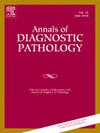Diagnostic immunohistochemistry use in Belgian laboratories
IF 1.5
4区 医学
Q3 PATHOLOGY
引用次数: 0
Abstract
Objectives
In Belgium, the use of IHC testing has grown in the last decade. However, there is a lack of information on the specific indications for which it is reimbursed. The aim of the study is to offer an overview on the use of diagnostic inmunohistochemistry (IHC) testing and its recent trends.
Methods
Our analysis is limited to reimbursed use, which in Belgium is restricted to a maximum of 4 different IHC stains per sampling session for diagnostic IHC. Consulted sources included data from the compulsory health insurance, and data extracted from a sample of pathology reports gathered from Belgian laboratories for the year 2019.
Results
Over the last 10 years, the use of IHC in Belgium grew from 729 030 stains in 2012 to 1,194,331 in 2019, an increase of 63.8 % while the increase in the number of histological or cytological examinations was 13.3 %. The main stains used in 2019 were H. pylori, Ki-67 and broad spectrum CK, which were used in multiple body sites, reflecting the difficulties to identify specific indications. The gastro-intestinal tract is the body site with the highest number of IHC stains (38.2 % of all stains performed), and the most frequently used stain in gastro intestinal biopsies were H. pylori (43.1 %), and CD3 (6.8 %).
Conclusion
This study offers an overview of the most frequent indications for which diagnostic IHC staining is used in Belgium, and reflects the evolving nature of this field, highlighting the importance to increase clarity and improve data collection.
比利时实验室使用的诊断性免疫组化技术。
目的:在比利时,IHC 检测的使用在过去十年中有所增长。然而,关于其报销的具体适应症却缺乏相关信息。本研究旨在概述诊断性免疫组化(IHC)检测的使用情况及其最新趋势:我们的分析仅限于有偿使用,在比利时,诊断性 IHC 每次取样最多只能使用 4 种不同的 IHC 染色剂。参考来源包括强制医疗保险的数据,以及从比利时实验室收集的2019年病理报告样本中提取的数据:在过去10年中,比利时的IHC使用量从2012年的729 030种染色剂增加到2019年的1 194 331种,增幅为63.8%,而组织学或细胞学检查的数量增幅为13.3%。2019年使用的主要染色剂是幽门螺杆菌、Ki-67和广谱CK,它们被用于多个身体部位,反映出难以确定特定适应症。胃肠道是IHC染色最多的身体部位(占所有染色的38.2%),胃肠道活检中最常用的染色为幽门螺杆菌(43.1%)和CD3(6.8%):本研究概述了比利时最常用的诊断性 IHC 染色适应症,反映了该领域不断发展的性质,强调了提高清晰度和改进数据收集的重要性。
本文章由计算机程序翻译,如有差异,请以英文原文为准。
求助全文
约1分钟内获得全文
求助全文
来源期刊
CiteScore
3.90
自引率
5.00%
发文量
149
审稿时长
26 days
期刊介绍:
A peer-reviewed journal devoted to the publication of articles dealing with traditional morphologic studies using standard diagnostic techniques and stressing clinicopathological correlations and scientific observation of relevance to the daily practice of pathology. Special features include pathologic-radiologic correlations and pathologic-cytologic correlations.

 求助内容:
求助内容: 应助结果提醒方式:
应助结果提醒方式:


